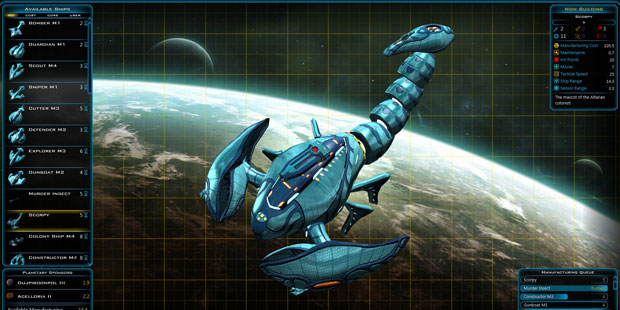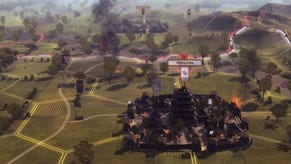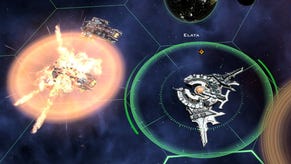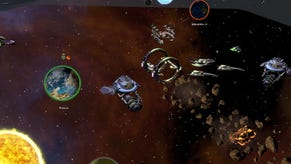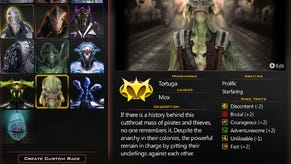Impressions: Galactic Civilizations 3
Should You Buy It Yet?
Gal Civ 3 has warped from Early Access alpha to Early Access beta, and brought with it more (but not all) features to the famous, 4X strategy game. Is it worth your time or money yet? We sent Brendan to investigate.
Picture the scene. You are a peaceful, religious race of extra-terrestrials, but you are inexplicably at war with the three rival civilisations that surround you. Your people love you for your mindfulness but they are upset that they don't have more money to spend. Your desert planet full of shopping centres is deeply unhappy. Your planet full of scorpions is booming. Huge lettering drops from the sky! GALACTIC CIVILIZATIONS III.
The Early Access renaissance has brought with it a vast hinterland of games that are half-worth getting. Galactic Civilizations III, right now, is another game like that. The bones of the thing are there but the tendons, ligaments and nerves of the game have yet to be added. In this disgusting metaphor, it is not yet a whole body. But it is relieving that, as a skeleton, it looks very good. And you can see exactly where the design is headed.
Gal Civ is a big name in the 4X strategy genre. As a game which is all about collecting anti-matter from black holes and taking planets from the poor indigenous species that inhabit them, the third installment is on a great path. And you can see that path for yourself in the game's research trees, even if some of the options are currently unavailable, teasing you with the text: 'DISABLED FOR BETA' – to all intents and purposes, a capitalised 'out of order' sign. At times this can be frustrating. Working your way up the Planetary Invasion route only to discover those cool-looking Interstellar Marines are essentially on holiday can cause teeth to grind. With more forward-planning than me, you can avoid that. But you might not be so easily placated to discover, after dropping the £29.99 cheque, that the entire Diplomacy menu is still marked as 'Coming Soon'.
So it's war for now. Well, war and colonisation. The latter is probably the most interesting as it stands, so let's look at that. I started off with a single planet, a shipyard, a small levy of scouts, a survey ship and a colony ship. Very soon I had set my scouts to auto-explore and my survey ship to swoop around inspecting any ship graveyards or strange artifacts it found. Meanwhile, I got colonising every habitable planet I could find.
Gal Civ II's ethical choices make a return here, presenting you with a planetary problem as soon as your colonists touch down. I was troubled mostly by environmental problems. A huge, sea-faring beast chomping my colonists on one planet. On another, sentient quadropeds attacking lone settlers before running off to the woods. The third planet? Scorpions.
The choices are fairly clear-cut in terms of Nasty or Nice but the benefits and penalties to each are going to be what drives pragmatic players. I am not pragmatic. I decided to keep the scorpions, for example, and my population strangely came to adore them, increasing contentment across that world.
The hex-based, single-plane of space can be set to different sizes before everything starts, and the game allows you to set the rarity of planets, stars and anomaly to whatever you think might be interesting. I opted to keep everything at the default 'occasional', because I enjoy the idea of an 'occasional' black hole. But you might think otherwise. Putting resources at a level where they become uncommon or rare will obviously make things on a smaller map more tense.
Not that you will need tension to threaten a war in the beta. With diplomacy disabled for now, war is your only option. It is a pity combat between ships is an opaque formula and, historically, this may not be surprising (Gal Civ II's combat looked like this). There are three types of attack (beam, missile and kinetic) and a defence system for each of these (shields, armour and point defence). So combat is a matter of balancing ships, getting them together in an optimal fleet and having them fight the right enemies. Even so, the battles always felt a little beyond my understanding, even if I was winning. It may simply be because there is no tutorial yet to explain the combat systems (or anything) or it might just be my bad maths. Someone will likely elucidate the matter in the comments but for the moment following the rule of 'bigger numbers is better' seemed to work for me.
But a better understanding of arithmetic will not necessarily save fights from being irritating. The 'confirm battle?' pop-up that hits your screen when an AI enemy strikes you on its turn is infuriating (see above). What battle? Where is it? Who with? And why do you even ask me to confirm, if there is no other choice but 'DONE'? This is obviously a Beta placeholder for the battle viewer (which will let you watch your space brawls play out) but it still sours the already underwhelming war side of things.
Luckily, you can unwind from these annoyances by creating your own ships. And the designer included is great. Like previous incarnations, it isn't simply a way to give your fighters a paintjob or shape them into a robot with a penis. You can equip them with any weapon, defence module, hyperdrive engine, etc. Anything you have successfully researched, that is. As the heavier hull sizes unlock, you'll be able to carry more weaponry and upgrades into battle. The customisation options here are ludicous and the designer is easier to use than it first appears. For example, it took me a very short amount of time to create 'Scorpy', the official mascot of the Altarian colonialist.
The colonies themselves are a puzzle (but a neat one). Building up your planet is still confusing thanks to the current lack of any tutorials, but once you have it figured out it's basically a process of putting the right structures next to one another - a bank adjacent to two markets, a manufacturing capital next to two mega-factories - to set planet to achieve great things. Still, the people of the planet will get unhappy. For instance, if there is over-population, or they are not seeing any of your civilisation's great wealth. For some reason solar flares also upset them.
Once you research and understand the things your people need and want, you can begin to tweak your planets to a perfect specification. As a consequence of the way the adjacency bonuses work (buildings buffer certain types so long as they are next to them), the best way to colonise in the early game is to make each planet specialise in one thing. One of my planets became a researching powerhouse, filled with science folk. Another became a planet consumed by the desire to shop, where the only respite from their busy lives of spending was a trip to the planet's only spa. My only regret is not allowing one of my planets to be discontent for long enough to hit 0% approval, just to see what happens.
It is a pity that, since there are no diplomacy options yet, I could see no visible need to build anything that increases a planet's influence, such as consulates. It was a while before I realised this but as soon as I did, the peaceful Altarian agenda turned from constructing farms and cruise holiday ports to demolishing every embassy on every planet, to the spiteful protests of absolutely nobody.
So, let’s ask the only question that matters. Should you buy into the beta? Sadly, no. I don't think you should. I can absolutely see a great game in Gal Civ III, the spread and depth of the research trees (four altogether - Colonisation, Engineering, Warfare and Influence) is crazy. And the ship designer is going to lead creative players down a sci-fi shaped hole for hours. But too often you will hover your mouse above an interesting button only to see the words 'Coming Soon' or 'DIABLED IN BETA'. And since war is the only option, the niggles with combat make even that option, as it stands, unpalatable. For the price they are asking, I would stand off for now. But know that it is going to be good. You can see it in the bones.
Galactic Civilizations III is available through Steam Early Access for £27.





